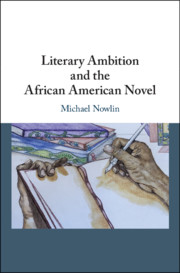Book contents
- Literary Ambition and the African American Novel
- Literary Ambition and the African American Novel
- Copyright page
- Dedication
- Contents
- Acknowledgments
- Abbreviations
- Introduction
- Chapter 1 “The First Negro Novelist”: Charles Chesnutt’s Point of View and the Emergence of African American Literature
- Chapter 2 James Weldon Johnson’s Dream of Literary Greatness and His Groundwork for an African American Literary Renaissance
- Chapter 3 The Strange Literary Career of Jean Toomer
- Chapter 4 Wallace Thurman’s Judgment and the Rush toward Modernism
- Chapter 5 Zora Neale Hurston and the Great Unwritten
- Chapter 6 Richard Wright’s Compromises: Radicalism and Celebrity as Paths to Literary Freedom
- Chapter 7 “Literary to a Fault”: The Singular Triumph of Ralph Ellison
- Conclusion
- Notes
- References
- Index
Introduction
Published online by Cambridge University Press: 17 October 2019
- Literary Ambition and the African American Novel
- Literary Ambition and the African American Novel
- Copyright page
- Dedication
- Contents
- Acknowledgments
- Abbreviations
- Introduction
- Chapter 1 “The First Negro Novelist”: Charles Chesnutt’s Point of View and the Emergence of African American Literature
- Chapter 2 James Weldon Johnson’s Dream of Literary Greatness and His Groundwork for an African American Literary Renaissance
- Chapter 3 The Strange Literary Career of Jean Toomer
- Chapter 4 Wallace Thurman’s Judgment and the Rush toward Modernism
- Chapter 5 Zora Neale Hurston and the Great Unwritten
- Chapter 6 Richard Wright’s Compromises: Radicalism and Celebrity as Paths to Literary Freedom
- Chapter 7 “Literary to a Fault”: The Singular Triumph of Ralph Ellison
- Conclusion
- Notes
- References
- Index
Summary
Introduces the argument about the literary ambition motivating landmark African American novelists from Charles Chesnutt to Ralph Ellison, and essential to the creation of a world-class African American literature. Introduces the general argument that these African American novelists based their hopes for literary success on the fundamentally enabling assumption of African American “literary destitution.” Assuming that the first “great” African American writer was yet to come, each writer aligned his or her individualistic ambition with the collective project of building an African American literature. In practice this led to later generations of writers making “sacrificial precursors” of those who had achieved but short-term, relative success in the past, and who came to seem dated or overly conventional in response to the growing prestige of international literary modernism that added a pressure to be “modern” to the pressure to be “literary.” The introduction challenges notions of an internally developing African American literary canon by insisting on the extent to which African American literature developed internationally and comparatively, through the work of writers who inescapably measured literary success in terms of the modernist literature being canonized within the literary field they struggled to win prominent positions in.
- Type
- Chapter
- Information
- Literary Ambition and the African American Novel , pp. 1 - 24Publisher: Cambridge University PressPrint publication year: 2019

